The impact of WW2 on young people in the Suburb
When Britain joined the Second World War, it was another Sunday morning near the beginning of the academic year for young people in both the Suburb and around Britain. Alan Cohen, who has lived in the Suburb all of his life, was only 9 years old when war broke out, and notes in his memoirs: “We were in Bournemouth on the morning of September 3rd 1939, when we heard the broadcast...Immediately we returned home by car to London”. The situation progressed rapidly and by the next year (September 1940), air raids had become a continual hindrance to education. Looking through logs and archives at The Henrietta Barnett School and Garden Suburb School during this period, we can see that “Enemy action”, became a persistent cause of school closures, lower attendance rates (for example the GSS records showing attendance dropping to 75% “owing to air-raids” (June 23rd 1944)) and reduced contact hours of schooling. While the obvious impact this had on the lives of all in the community is significant, the impact on children and students is an often less commented on and equally interesting factor to consider. 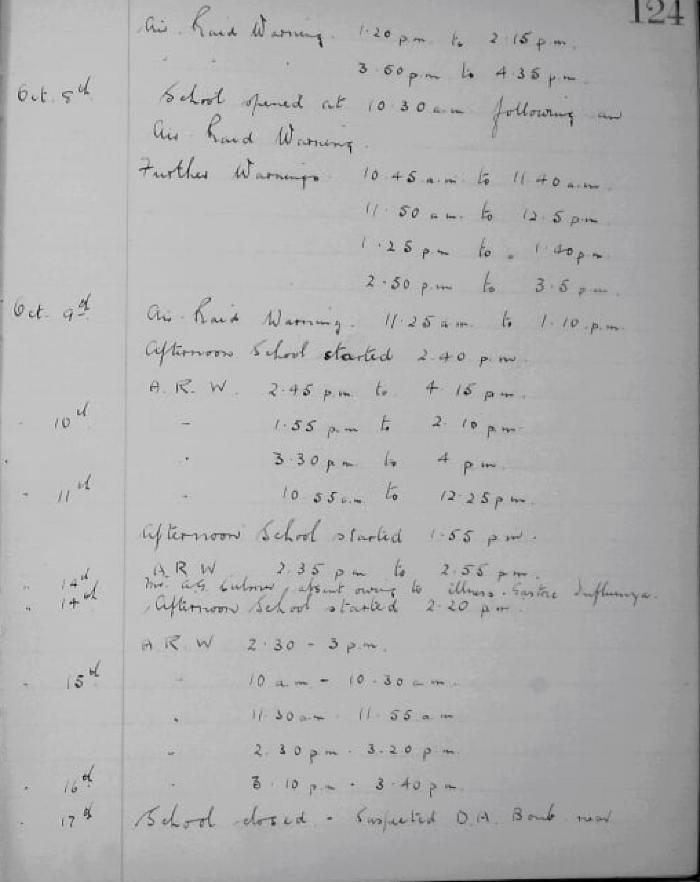
Caption:GSS Headmaster’s mixed log, recording Air Raids, notice 8th & 17th October 1940.
School procedures and wartime measures
There was a genuine attempt on the part of the adults who worked with young people in the Suburb to maintain a degree of normality. At the start of the war teachers at Henrietta Barnett were encouraged to avoid lengthy discussions about the war to prevent the spreading of “false information”. Despite recurring mentions of the need for “paper economy'' in the minutes of staff meetings and head teacher’s logs, there was equally a stress placed on the importance of girls keeping work clearly ordered and neat. The emphasis seems to have been on incorporating necessary war time measures in a way which kept structure and routine to the lives of the children. This is particularly seen at the Garden Suburb School throughout the period- the students received talks throughout the period on topics such as “the use of the gas rattle” (15th December 1941), and “Care of Respirators” (7th March 1942). Trench drills and air raids became routine as the war progressed, and we can even see the students of Garden Suburb improve their efficiency with practice- between January and April 1940 the speed in which “all children are safely sheltered”reduces from three minutes (16th January) to one and a half (3rd April). A.R.P (Air Raid Precautions) practices and raids themselves increase in frequency to points in autumn 1940 and Spring 1944 when both HBS and GSS start to record days with no raids as opposed to those when they do occur. These events inevitably became a ‘new normal’, as the daily routines of students and teachers in the Suburb changed to incorporate wartime considerations.
Impact on school staff- lives, roles and influence of teachers
There was of course an impact on the lives and roles of school teachers, as they tried to maintain normalcy for their students while dealing with the personal impact of the war on their own lives. The most obvious change was in the depletion of male staff members as they were conscripted, while a number of female teachers left with evacuated pupils, and were sent to other schools where the impact had been felt more severely- in September 1940 teachers were dispersed to “Wessex Gardens, Edgware Council, and Dollis School”. Teaching continued to play a vitally important role, a sentiment emphasised at the time in Government leaflets; “no woman teacher should have any doubt where her duty lies”.
Wider impact on women’s roles
The wider impact on the role of women, now acting as single parents in their households was also clear in the evidence from the archives. In July 1942 we hear of the first ‘headteachers conference’ regarding keeping local schools open during the summer holidays to provide childcare ‘for the children whose mothers go out to work’. By the Christmas holidays of the same year this seems to have become a common practice, with discussions taking place coordinating the programme among GSS, Algernon Road School and Orange Central School. At a time when more women were now both alone in looking after their children, and entering the workforce (more than two million extra women were at work in 1943 compared to before the outbreak of war), it is in many ways fascinating to see how this affected childcare and schools in such a specific example. 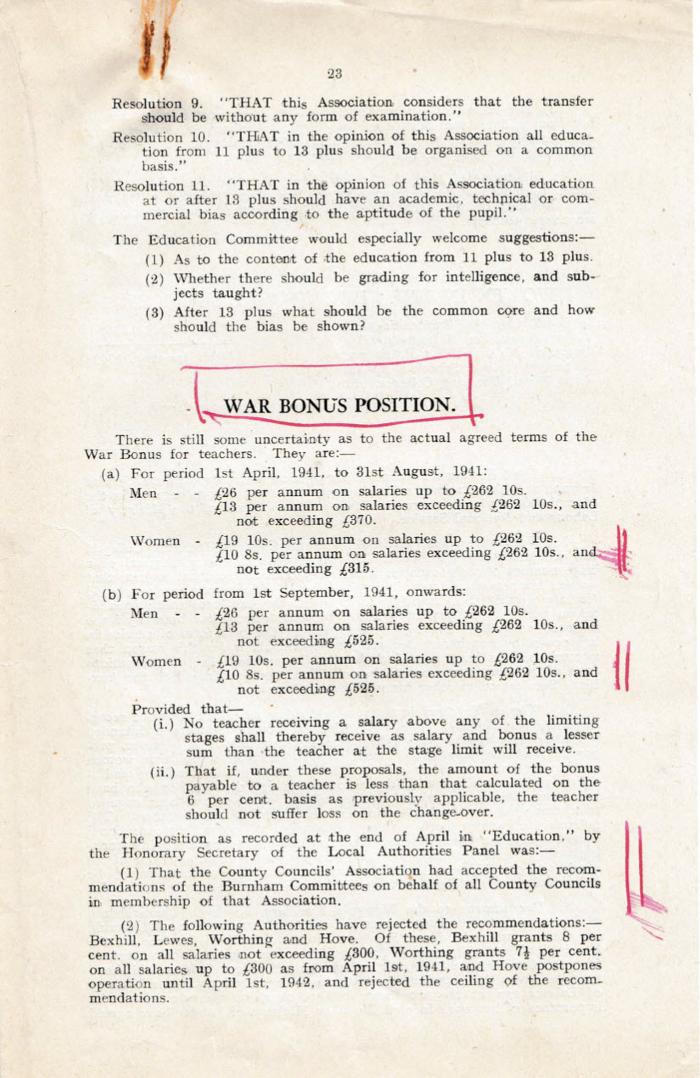
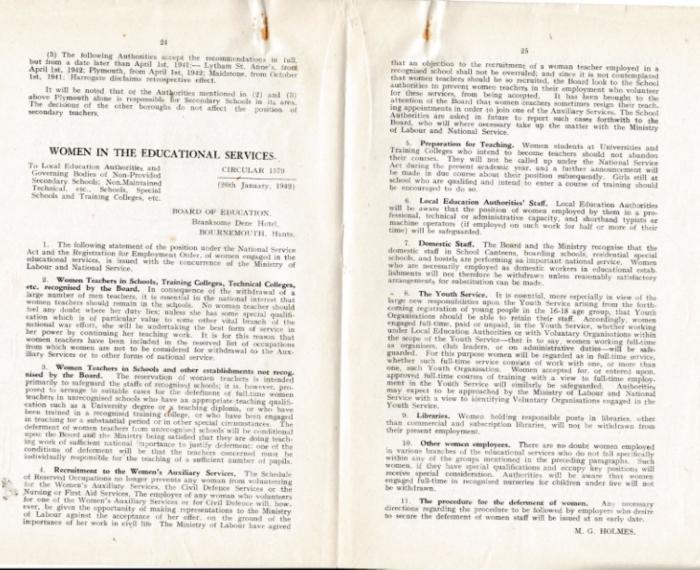
Caption: War Bonus Position for teachers leaflet, found in HBS Procedure book
Caption: War Bonus Position for teachers leaflet, “no woman teacher should have any doubt where her duty lies”
This was a time when teachers were facing huge personal tragedies- the deaths of sons and husbands and news of murdered relatives in Nazi occupied Europe particularly for Jewish members of staff. On the 19th of March 1940, the headteacher of GSS recorded “with great regret the death of Miss PG Lime as a result of enemy action”. No other direct deaths are reported in the logs of either Suburb school during the war, but we can assume the communities were impacted in the same devastating way as the rest of London was during the Blitz.
There are more positive endings to the stories that the staff logs tell. Miss Ashworth of GSS spent much of the war evacuated with various groups of students, and finally “returned from evacuation duty in Huddersfield” in January 1945. On the 29th of June of the same year she left to be married, perhaps to a man recently returned from military duty when the war ended. Miss Ashworth’s engagement was celebrated by the other teachers at the school.
School life: how aware were young people ?
“Aged 15, I knew only little of this. The exploding of the atomic bombs on Japan seemed to be no more than what main its purpose was, a means of ending the war...world events were not played out in front of you as today. There was no satellite television, indeed no television at all during the war”- Alan Cohen’s memoirs
Impact, awareness and community war effort
“A reminder was again given that many girls are living in exceptionally difficult circumstances and there is great need for care in dealing with them.”-24 th June 1940, HBS Staff meeting minutes.
From school magazines dating back to 1939 (in the Henrietta Barnett School archives) there can be seen a shift in writing topics of the girls post war, indicating the far-reaching impacts the experiences may have had. The sense of the military having been brought increasingly into focus, can be seen through just simple, short pieces of their creative writing involving soldiers, “the Navy Department”, “the War Department” and Naval hospitals-even as late as in the 1947 magazine. Similarly there is evidence at GSS of this increased awareness- they actually even adopted a ship and received two visits (in January 1943 and May 1944) from Captain Hammill OBE, master of their adopted ship as well as a Mr Britten-secretary of the Ship Adoption Society; presumably to heighten consciousness of the Navy’s role. 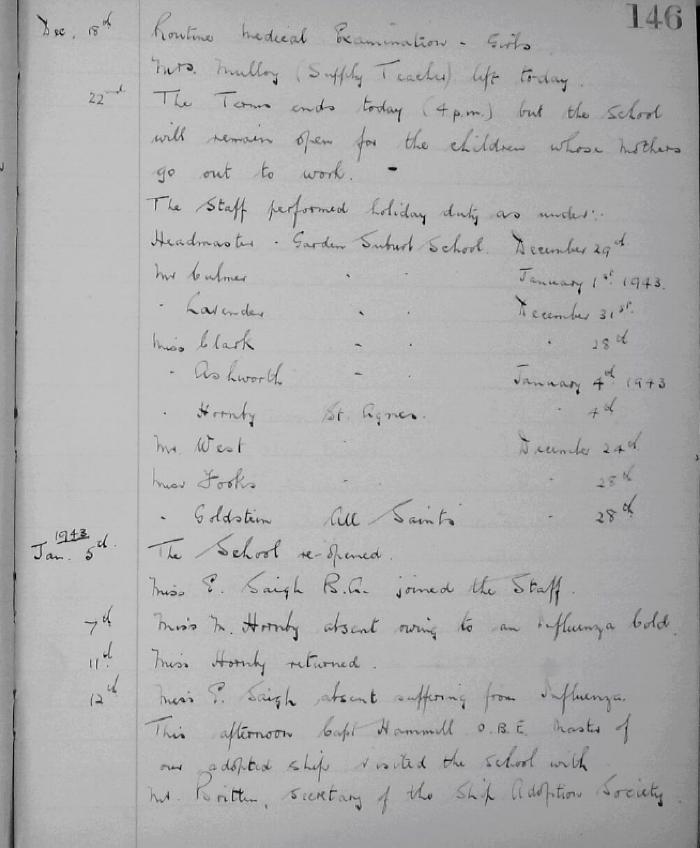
Caption:GSS Headmaster’s mixed log, 1943-details of the Captain’s visit (see January 12th)
Instead of accounts of recent trips abroad (like those that filled the previous HBS magazine of 1939), there are the obvious hints of student awareness with poems titled things like: “Rations” (1946), as well as more subtle hints of the continuing repercussions of war in daily life; mainly how people’s perspectives had altered. For example, in the careers corner of the 1946 magazine, there is a brief promotion of military work and colonial nursing by an old girl who had chosen to become a health visitor: “if you wish to travel you may join the Army or Colonial Nursing Service…” she writes.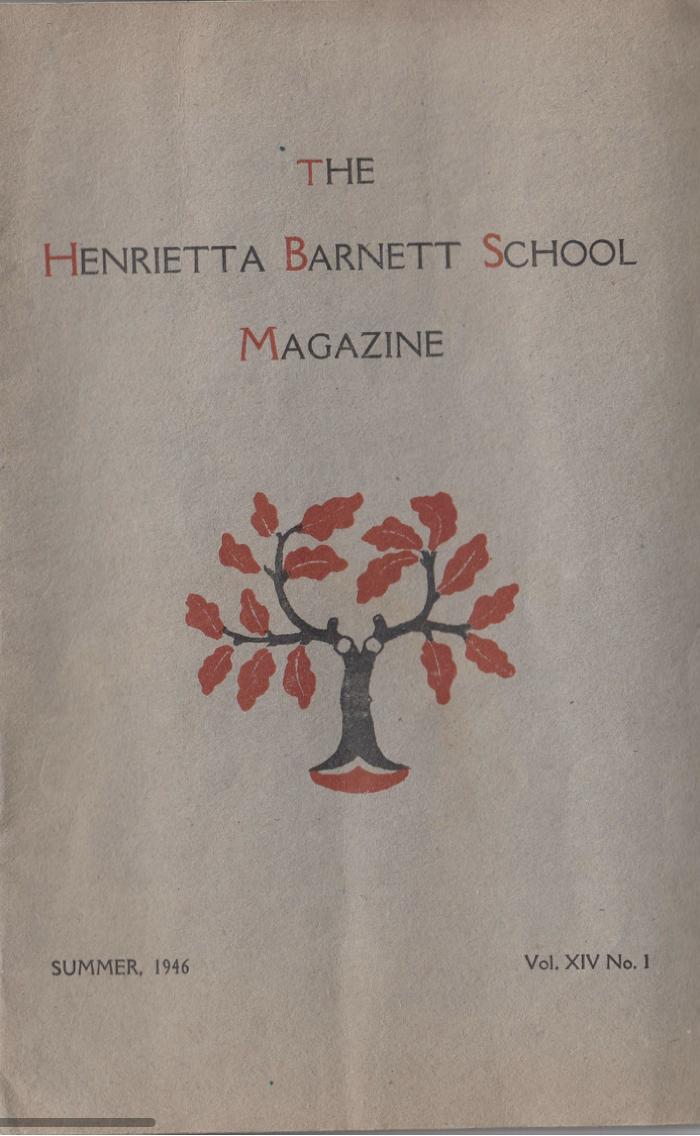
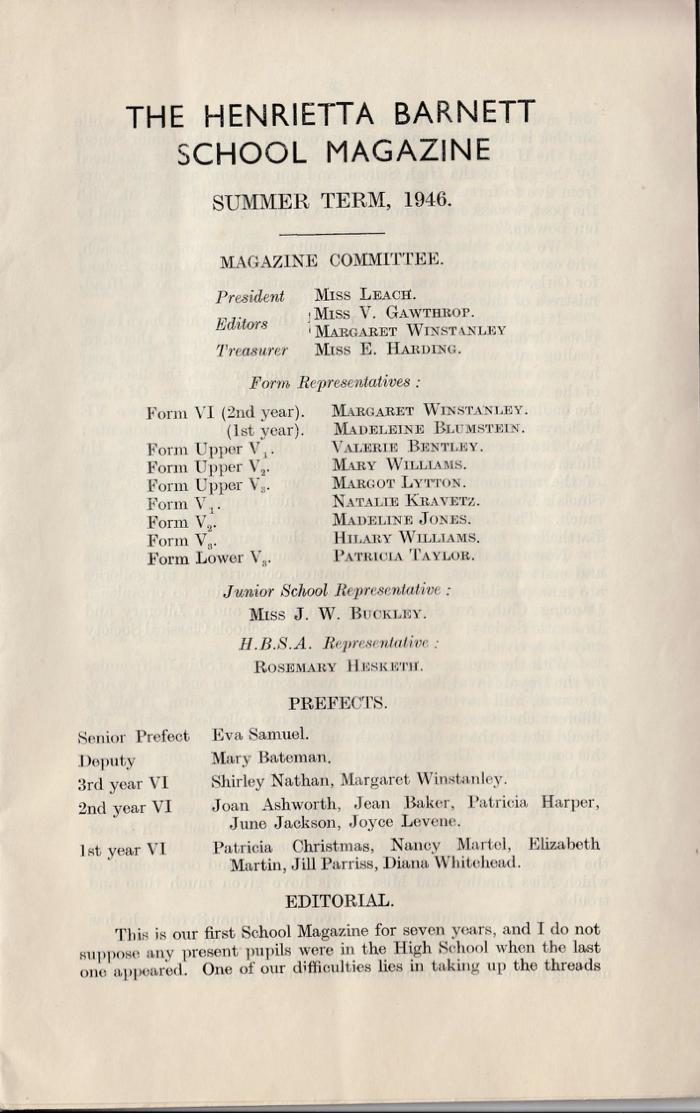
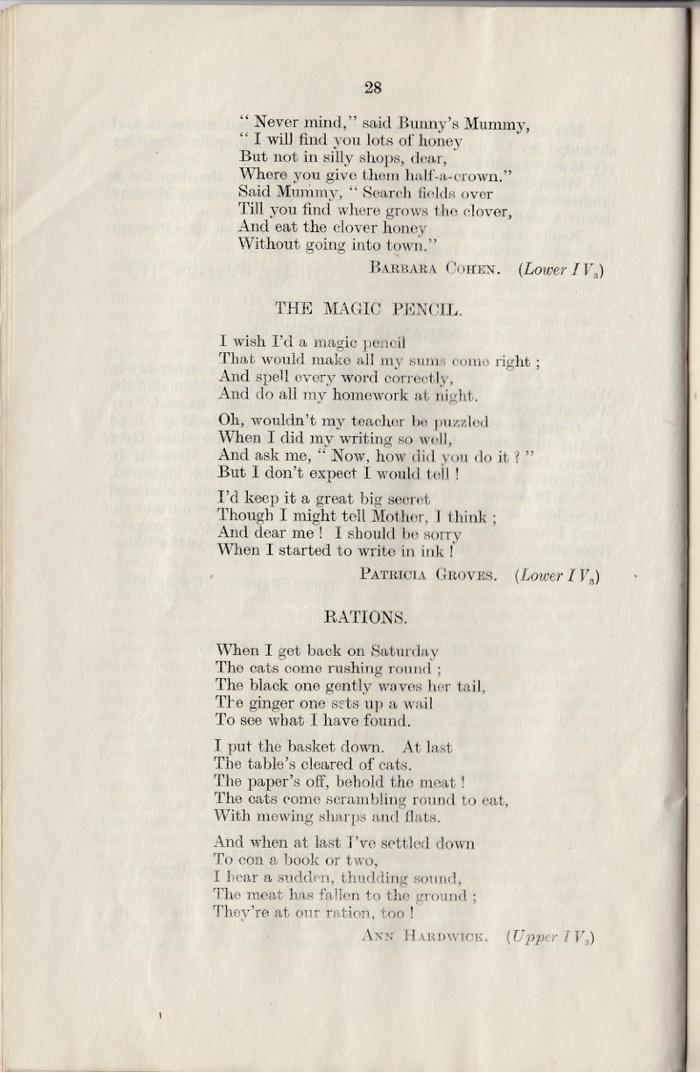
Caption: HBS’ 1946 Magazine cover
Caption: HBS’ 1946 Magazine: editorial announces it is the first magazine since the war ended
Caption: Poems written by girls at HBS in the 1946 Magazine
None of this is to say youngsters were completely ignorant of the situation as it was unfolding in front of them, in fact the HBS Staff meeting minutes: 28th April 1940 suggest “the staff should bear in mind all possible home difficulties, when dealing with the girls and make what allowances are thought possible”, implying youngsters were not in any way shielded from consciousness of harsh realities, such as the bombings. Furthermore, HBS specifically acquired new maps to encourage “the intelligent interest in the geography of the war”, noted in a staff meeting, April 10th 1940. On a similar note, the GSS headmaster’s log records 180 children present who “very much enjoyed” films shown by the Ministry of Information on March 24th 1940. Additionally, the HBS students were made aware that their regular charity money was diverted to the “Channel Island Refugees fund” to make good use of the donations regardless, since the Middlesex hostel (which they usually donated to) had been closed due to the war.
In this sense, the students from both schools did educate themselves on current affairs and demonstrated an interest in the details of the conflict around them. A key part of this is shown in their willingness to be of use and help out with whatever means they could muster. In addition to their charity donations to the refugees fund, staff meeting minutes (29th April 1940) at HBS document a plan to collect small amounts of money per girl each term in their form rooms, to raise £5 to adopt a French baby under the Anglo-French Solidarity Committee Scheme. Similarly, students at GSS raised a sum of £924 through a dancing display held at Childs Hill School in connection with War Weapons Week. Details of this mention the several meticulous rehearsals and hard work put in by the small group of 22 students- who would have had a real appreciation of the situation to do this. 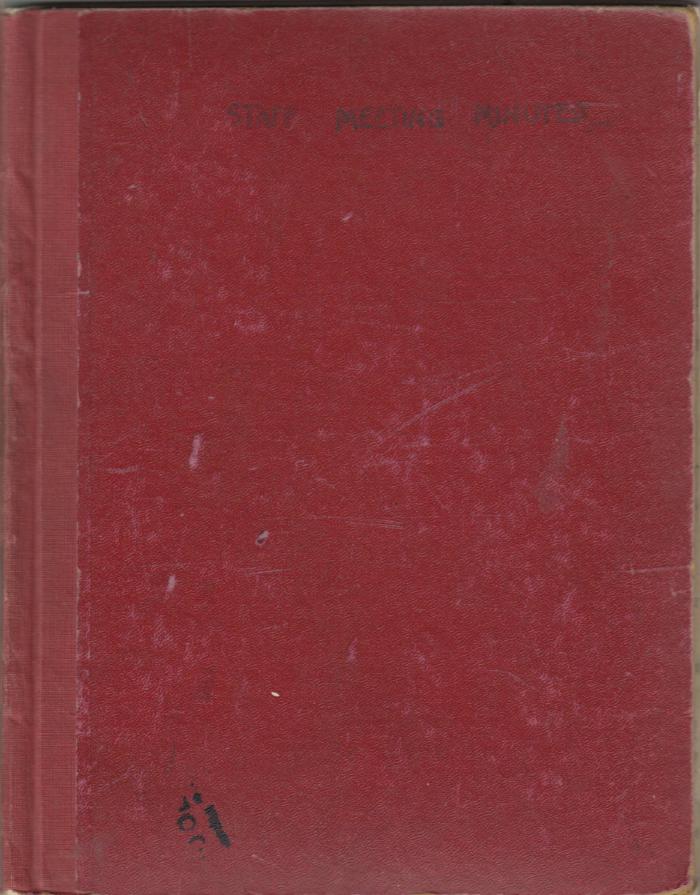
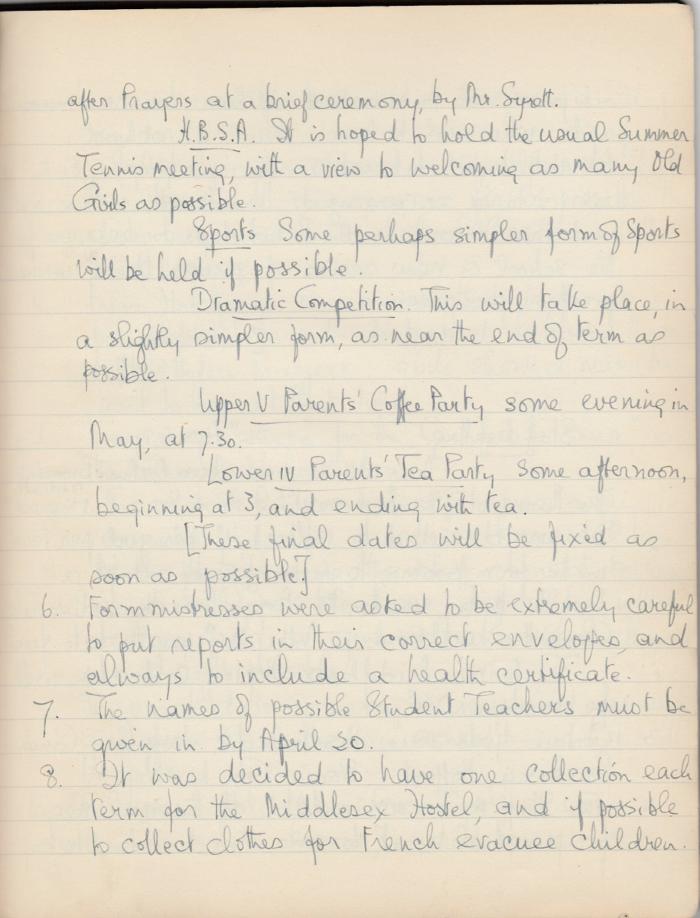
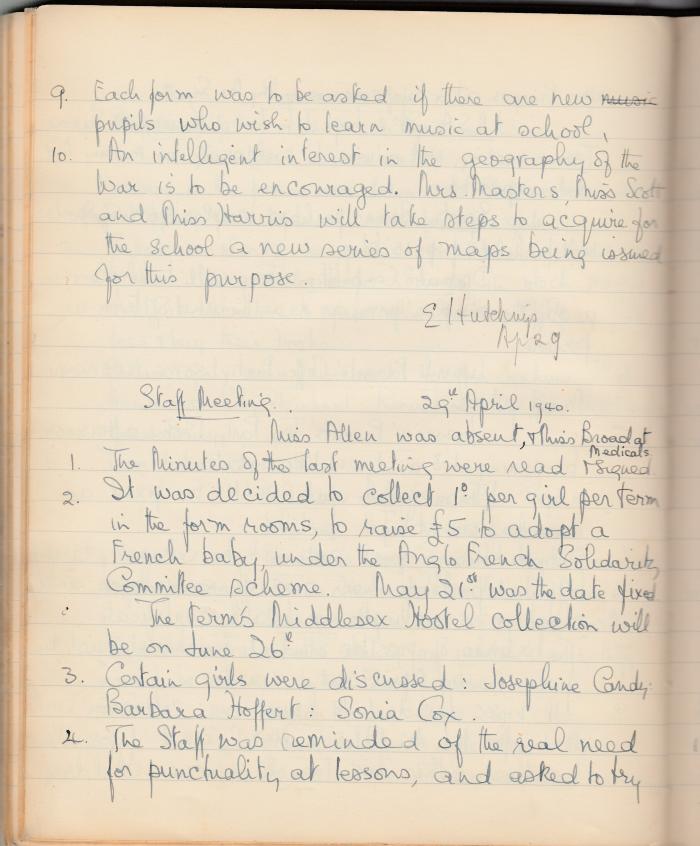
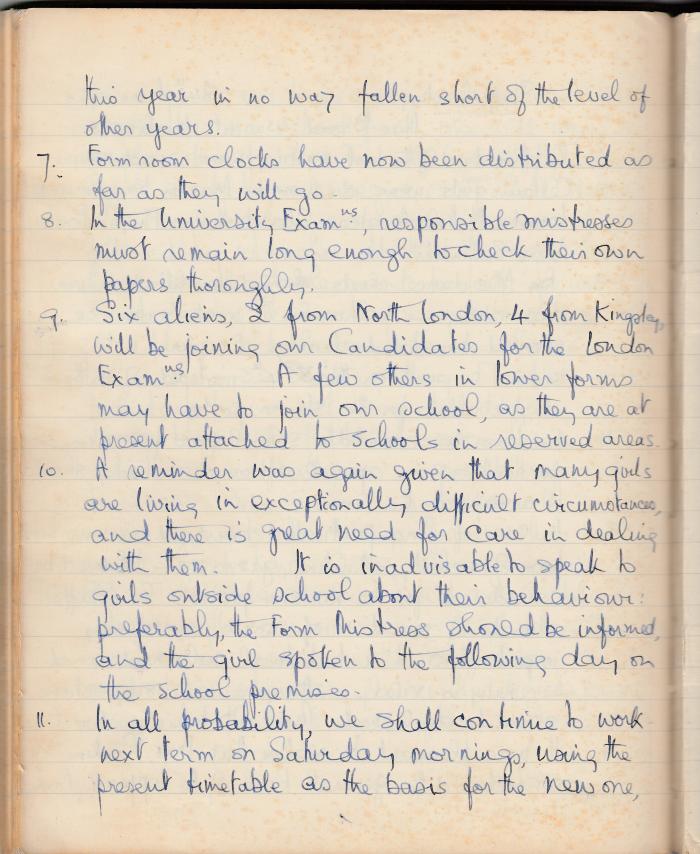
Caption: HBS Staff meeting minutes book (starting from 1935)
Caption: Staff meeting minutes, HBS April 1940: Initiative to collect clothes for French
Evacuee children (last bullet point)
Caption: Staff meeting minutes, 29th April 1940 at HBS-bullet point 2: plans to adopt a
French baby
Caption: HBS Staff meeting minutes book, 24th June 1940, “girls are living in exceptionally difficult circumstances”
“A demonstration of Fruit Bottling was given...There was also a display of ‘Science and Food’ in the Hall”- GSS Headmaster’s mixed log, 7th June 1940
Valiant efforts are recorded in the GSS Headmaster’s mixed log of the school trying to engage the parents and students in the art of wartime cooking with demonstrations of things like food preservation in light of the war effort, such as jam-making. However this was with limited success -”the response by parents was disappointing”. This is not to say though the war effort was not strong in the Suburb, on the contrary, both schools demonstrated a powerful drive to contribute. GSS persevered in their domestic sciences demonstrations, “with about a dozen parents attending” and it was even recorded that they spent every day of the week starting 19th May (1940), from 9.30 AM to 7PM as a selling centre in connection with War Weapons Week. 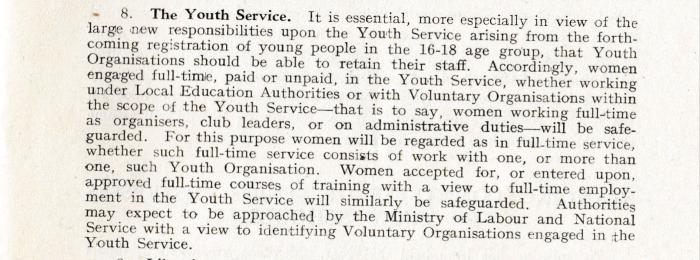
Caption: Taken from ‘War bonus Position’ leaflet-section on importance of The Youth Service
There were also the inevitable difficulties of re-adapting to school life before the war-which highlights the way in which school had evidently changed to some extent for young people during it. HBS particularly makes part of this trouble clear through the “Games Report 1945-46”, where the ‘disclaimer’ is: “In spite of the results of war conditions and the lack of good equipment…”. Yet nonetheless, they reported great successes in many of the tournaments and the rest of their magazines include details of book exhibitions, drama and reading competitions, showing great determination to put the war behind them and re-focus on school activities...
Although there was also the trouble of dealing with electricity cuts, but the 1947 HBS editorial thankfully clarifies that they were happy to be distrurbed at least-“not by enemy activity”.
Despite this all, the war did not put an end to every normal school event for young people. The 1944 education act for example, which provided free secondary education for all pupils, had a substantial influence on the lives of students and parents (arguably more so than the fruit bottling demonstrations)-and GSS hosted “a very successful parents meeting… in connection with regulations governing the examination for admissions to secondary school.” that same year. Likewise, the University of London exams still went on at HBS as did “Empire day celebrations” at GSS, with a “saluting of the flag in the playground”. In this sense, war did not massively alter every single aspect of life-as is commonly misconstrued. It was imperative for life to go on in spite of every challenge, for the sake of both morale and pragmatism.
Shifting demographics: Diversity and ‘aliens’ in the Suburb (HBS and GSS)
“Six aliens...will be joining our candidates for the London exams. A few others in lower forms may have to join our school.”- HBS Staff meeting minutes, 24th June 1940
The admittance and integration of ‘aliens’ into the Suburb’s schools had a profoundly visible effect; shifting certain established demographics. For example, the HBS Staff meeting minutes of 2nd November 1939 specify: “There will be no prayers at present” after announcing that there would be 17 Jewish and 14 Roman Catholic girls joining the school, in an attempt to avoid discomfort with their previously regular protestant prayers-which, when later resumed, became non-obligatory. There was an attempt to ensure everyone with different nationalities/religions were accommodated, which perhaps marks a beginning to the multiculturalism of the Suburb’s schools today. A few months later, in January 1940, the school also opened its doors to convent girls from Willesden Convent School. The school Procedure book notes concessions made for girls of different schools not being able to purchase the school frock having to only wear the school hat band instead. There are also other uniform concessions, these: “in view of the need for economy”, where for instance, plain white ankle socks became allowed-and many of these such changes to rules, mark the start in catering for concerns over integration. 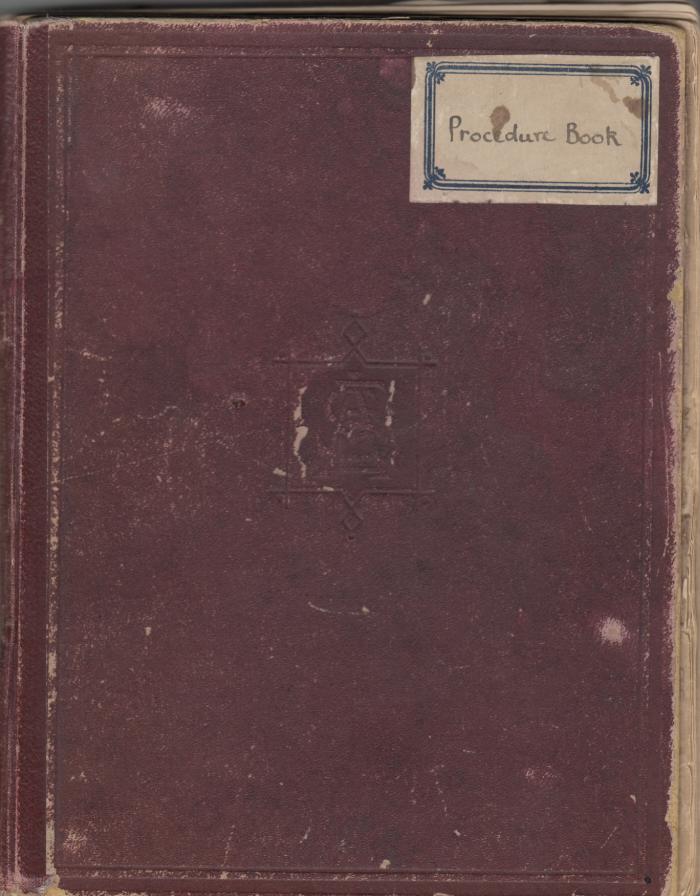
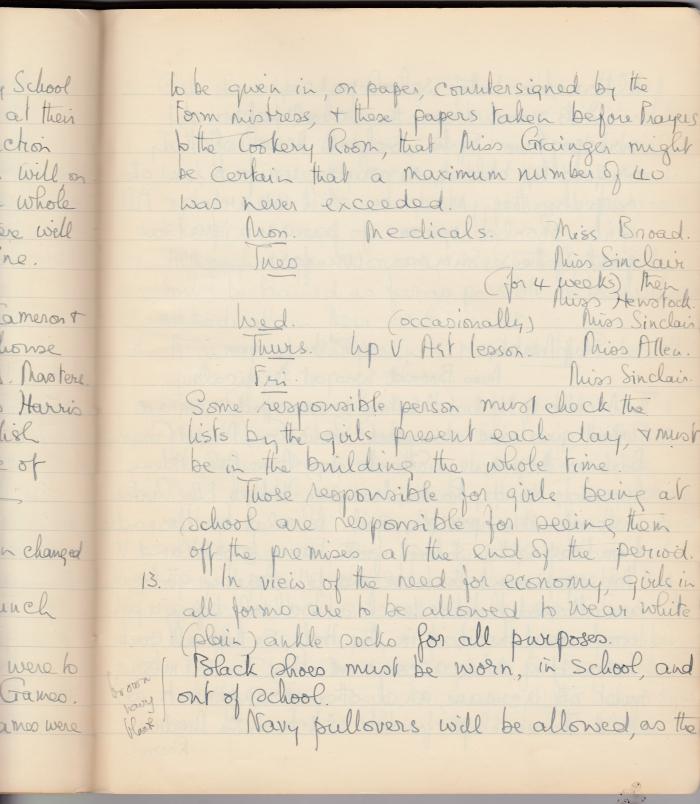
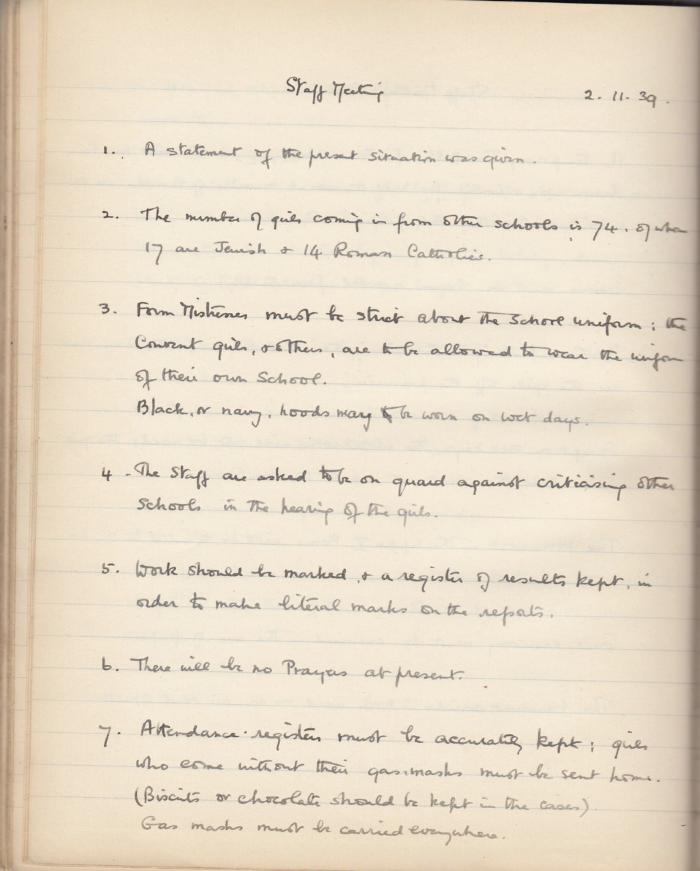
Caption: HBS Procedure book
Caption: HBS Procedure book-uniform regulation, “in view of the need for economy”. Caption: HBS Staff meeting minutes of 2nd November 1939: Girls from other schools are allowed to wear their uniform
There were also changes in dates given for holidays over the period as the number and presence of Jewish students for example, increased and there became high numbers of absentees over religious holidays. At HBS, the staff meeting minutes (April 1940) recognise the “Passover holiday” and the GSS log instead marks out “Jewish Holiday” each time, with attendance dropping below 60% on May 22nd 1942. 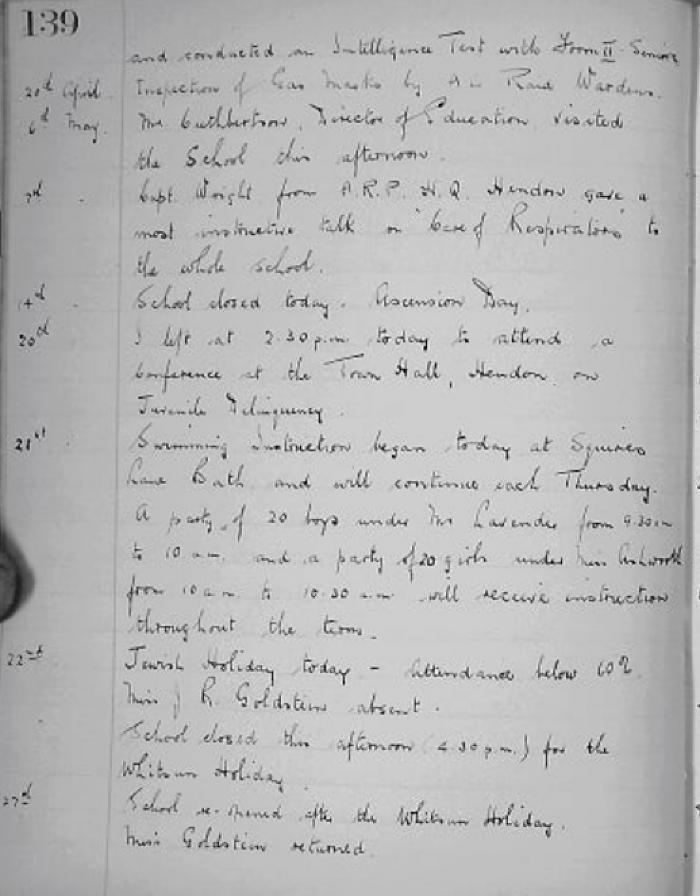
Caption:GSS Headmaster’s mixed log, attendance dropping below 60%, May 22nd 1942
Despite the admittance of new students and shifts in rules, standards were still kept high. The GSS Headmaster’s mixed log records the praise of an inspection (as early as 1939) for the school maintaining its reputation for good work even amid the “difficulty of teaching children of markedly different social background” , since the school had even admitted many refugee children just before the war broke out.
VE day and sense of national celebration
While there is a vast amount of evidence describing the changes and hardships experienced by young people in the Suburb during the war, there are also numerous accounts of the celebration and joy of VE day, the 8th of May 1945. We know that both the 8th and 9th of May were ‘off the cuff’ public holidays according to Alan Cohen, and that when school reassembled on May 11th, special services were held at both HBS and GSS. 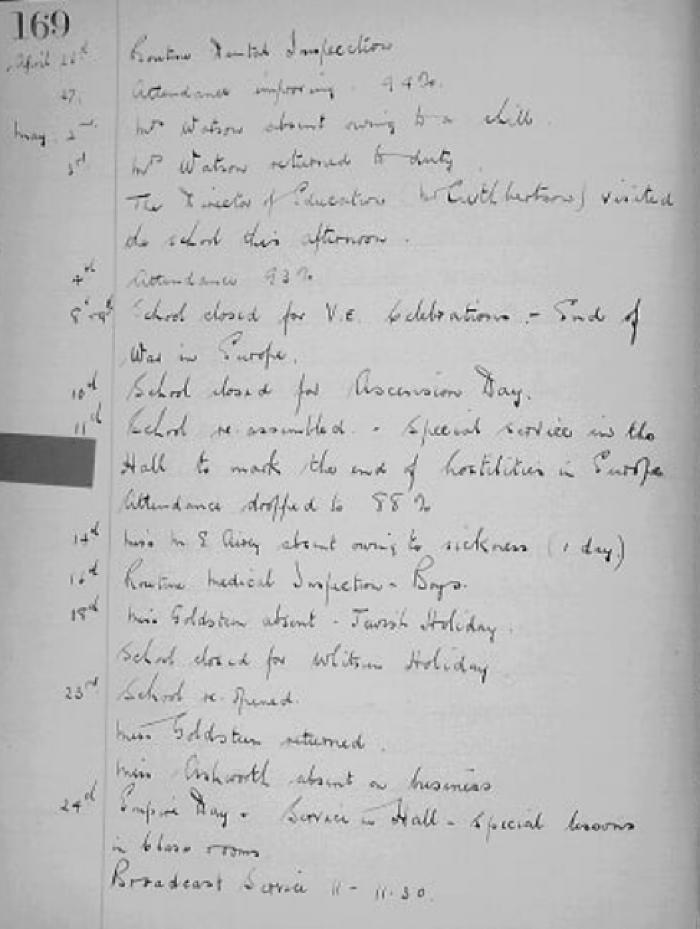
Caption:GSS Headmaster’s mixed log: “School closed for V.E Celebrations (May 8th-9th 1945)
Researching what life was like for students at our own school during the war was from the start a personal experience, but one which obviously became more poignant as we entered the COVID-19 lockdown period. While comparisons between our current global crisis and the one 75 years ago are easy to make but not always accurate, we have felt a genuine connection to the young people of the suburb living during the war, facing disruption and uncertainty and trying to adjust to a ‘new normal’. Despite the changes and upheavals described in this article, the overriding message from the archives and interviews we explored was that life truly does go on. Students at HBS and GSS, as well as their teachers, were still focused on the day to day practicalities and routine within an international crisis- HBS girls took their school certificate and practiced for dance display in aid of war time charities with the GSS junior girls department, and both schools sponsored charities and orphanages while still getting in trouble for uniform violations. Girls were encouraged to knit during air raids, and after A.R.P practices at the junior school, “milk and biscuits” were served to all students.
There was a wealth of content we were able to access from the early ‘40s that in no way centered around the war, and that in itself feels in some ways inspiring- how little a major crisis can pejoratively root itself in our minds and hearts despite the odds.
By Lia Joffe and Zaynab Ishtiaq Khan
HBS Year 12 Interns